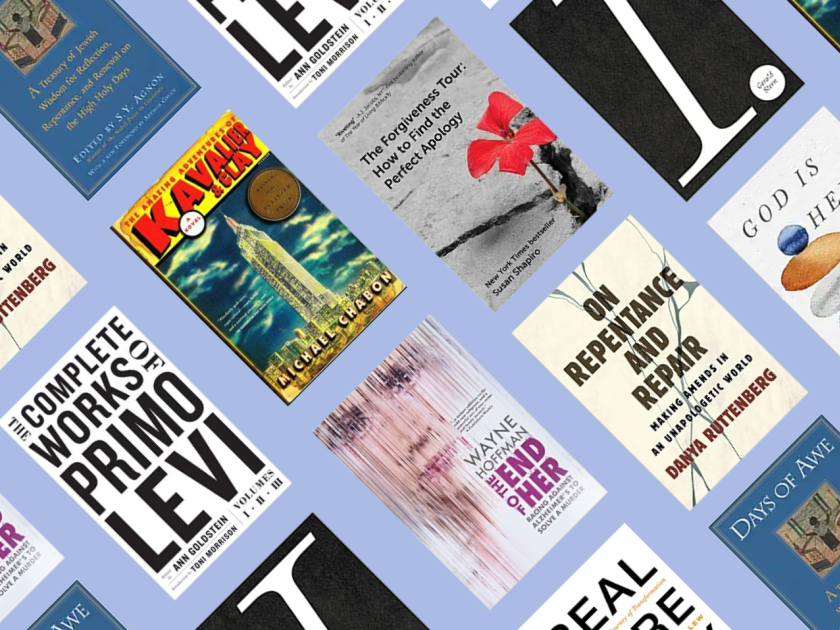
In celebration of the High Holidays, we asked thirteen writers to share a book they would recommend reading during this season. Touching on themes of renewal, reflection, atonement, forgiveness, prayer, and more, these selections promise a transformative experience.
Jean Meltzer, author, most recently, of Magical Meet Cute
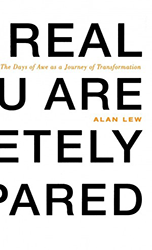
This is Real and You Are Completely Unprepared: The Days of Awe as a Journey of Transformation by Alan Lew
The High Holidays are a wonderful time to reconnect with the divine. Each year, I find myself returning to one book in order to aid my own spiritual development. This is Real and You are Completely Unprepared: The Days of Awe as a Journey of Transformation by Rabbi Alan Lew completely transformed my understanding of the Jewish High Holiday cycles. Blending Jewish text with spiritual lessons learned from a lifetime of contemplative practice, it’s a must-read for anyone seeking deeper spiritual meaning during the month of Elul.
Rachel Sharona Lewis, author, most recently, of The Rabbi Who Prayed for the City
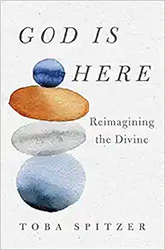
God is Here: Reimagining the Divine by Toba Spitzer
In God is Here: Reimagining the Divine, Rabbi Toba Spitzer mines the Jewish textual tradition for an enriched vocabulary of metaphors for God. For those of us for whom the image of a bearded man in the sky doesn’t quite work, God is Here reassures us that our forebears experienced God elsewhere as well: in water, in rock, in fire. This book is a powerful read during the High Holiday season, when many of us try to connect with God, but don’t always succeed. This book is a source of support and inspiration in that undertaking.
Yael Goldstein-Love, author, most recently, of The Possibilities
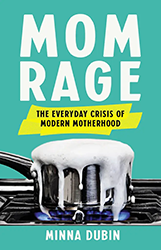
Mom Rage by Minna Dubin
Guilt and remorse can be among our most productive emotions, but only if they open us up and create curiosity about how to repair the harm we’ve caused and how to change moving forward. If instead we’re shut down in shame or self-recrimination, we do neither. To help the guilty mothers among us make amends and grow in the new year, I recommend Mom Rage by Minna Dubin, a powerful examination of the difficult feelings of motherhood sure to open you up to productive curiosity.
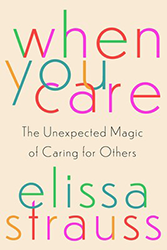
When You Care by Elissa Strauss
Another recommendation on the subject is When You Care by Elissa Strauss, which will refresh and revitalize your relationship to caregiving in all its forms.
Melissa Broder, author, most recently, of Death Valley
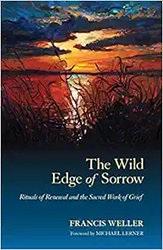
The Wild Edge of Sorrow: Rituals of Renewal and the Sacred Work of Grief by Francis Weller
My Rosh Hashanah book selection is The Wild Edge of Sorrow: Rituals of Renewal and the Sacred Work of Grief by Francis Weller. Long after the shiva period and year of mourning are over, how do we continue to acknowledge and make room for grief when it arises? Weller explores the life-affirming force of a sorrow fully-honored, and prescribes rituals for doing so. He describes the act of “bringing grief and death out of the shadow,” in a culture that puts happiness at a premium, as our “spiritual responsibility.”
Felicia Berliner, author, most recently, of Shmutz
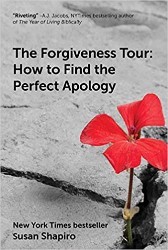
The Forgiveness Tour: How to Find the Perfect Apology by Susan Shapiro
If the idea of receiving an apology from someone who hurt you is tantalizing, Susan Shapiro’s The Forgiveness Tour: How to Find the Perfect Apology is your go-to book. With stories of betrayal from the commonplace (cheating spouse) to the horrific (Serbian genocide of Bosnian Muslims), Shapiro explores the teachings of forgiveness from various religious traditions and offers some questions to start the process of repair. What do you want to say to the person who hurt you, and what do you want to hear from them? What would help you heal? A popular writing teacher in New York City, (full disclosure: I took a workshop with her more than a decade ago) Shapiro charts the details of her own hurt with humor and compassion. Does she get the apology she wished for? It’s worth the read to find out.
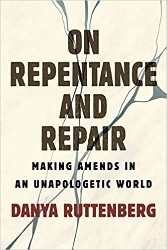
On Repentance and Repair: Making Amends in an Unapologetic World by Danya Ruttenberg
If there’s a force for repair on the internet, it’s Rabbi Danya Ruttenberg, whose social media posts immediately shift my doom-scrolling to soul-searching. In her book On Repentance and Repair: Making Amends in an Unapologetic World, Rabbi Danya reflects on our relationships to harm — the ways “we all cause harm sometimes,” “have all been harmed,” and “are all bystanders to harm.” She gives us a lens to reread Maimonides’ instructions for repentance and apply traditional Jewish ideas to contemporary harms. This book (coming out in paperback on September 12) will be my High Holidays companion.
Nora Gold, author, most recently, of 18: Jewish Stories Translated from 18 Languages
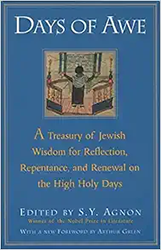
Days of Awe by S.Y. Agnon
I highly recommend S.Y. Agnon’s Days of Awe, a marvelous compendium of stories, commentaries, legends, and more, about the High Holidays. Structured according to the holidays’ chronology, this timeless classic is a book I return to every year, and that accompanies me throughout the holidays alongside my machzor. I love Days of Awe for its poetic beauty, its diverse genres that somehow cohere seamlessly and elegantly, and its ability to reveal to me every year something new, personally relevant, and revitalizing.
Tod Goldberg, author, most recently, of Gangsters Don’t Die
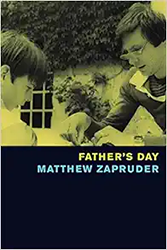
Father’s Day by Matthew Zapruder
One book that is never far from me this time of the year is Matthew Zapruder’s poetry collection Father’s Day. This collection is both a meditation on this strange modern life we’re all in together and the closed ecosystem of Zapruder’s home, where he and his wife are raising a son with autism. Zapruder writes with profound empathy, always, but it’s when he examines his own life that there is a delicate grace that speaks of faith and charity, hope and loss, all at once. We see that in these lines from his poem “My Life”:
can I say he is
my painful joy,
he thinks
in rhyme,
the truest friend
to no one yet
Zapruder is an elegant writer and the poems in Father’s Day reflect back the best of us, even in our hardest times.
Ashley Goldberg, author, most recently, of Abomination
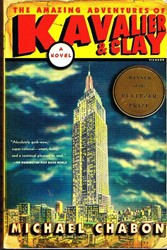
The Amazing Adventures of Kavalier & Clay by Michael Chabon Michael
Chabon’s masterpiece The Amazing Adventures of Kavalier & Clay is a fitting read for the High Holidays. Following the exploits of two Jewish cousins – amateur magician Joe and imaginative Sammy – and their comic book creation from Nazi-occupied Prague to New York to Antarctica, the novel has the scope and daring to match that of any superhero narrative. And yet the book’s greatest strength may be its superb characterization — the boys and their struggle with love, shame, family, and atonement.
Susan Shapiro, author, most recently, of The Forgiveness Tour: How to Find the Perfect Apology
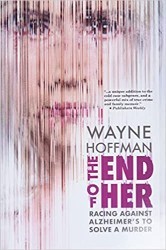
The End of Her: Racing Against Alzheimer’s to Solve a Murder by Wayne Hoffman
Tablet editor Wayne Hoffman’s fascinating debut memoir, The End of Her, is a perfect High Holiday book since it centers around Susan, his beloved Jewish mother. As a Manhattan journalist, Hoffman tries to solve the mystery of what really happened to his maternal great-grandmother Sarah, who was killed in Winnipeg in 1913. But it’s hard to crack a century-old unsolved murder with his mom declining from Alzheimer’s. Mixing true crime with this poignant personal crisis creates a unique and unputdownable family saga.
Ben Nadler, author, most recently, of The Jewish Deli: An Illustrated Guide to the Chosen Food
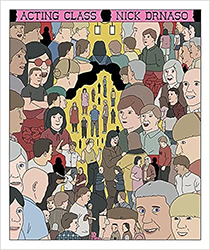
Acting Class by Nick Drnaso
Acting Class follows a group of strangers as they embark on a collective artistic process with an enigmatic teacher that has them looking so deep inside themselves, the lines of identity and reality become blurred. Though it features many individual characters with their own respective personal journeys, Drnaso does an incredible job following a narrative thread that brings them in and out of the present moment in a strange and uncanny story of self reflection.

Ducks: Two Years in the Oil Sands by Kate Beaton
This memoir of the author’s time working in Alberta’s oil sands examines class and gender politics through the eyes of a recent college graduate trying to pay back her student loans. Beaton looks back on the experience affectionately and critically, painting a complicated picture of becoming an adult in a harsh environment. Though genuinely heartbreaking at times, following Beaton’s arc is a harrowing and rewarding experience.
Leela Corman, author, most recently, of Victory Parade
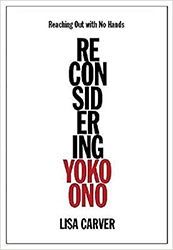
Reaching Out With No Hands: Reconsidering Yoko Ono by Lisa Carver
The atonement here is not Carver’s but ours, especially the patriarchal rock establishment that denigrates Yoko Ono as an artist and person. Carver, aka Lisa Suckdog, is a transgressive performance artist, writer, and publisher of the iconic zine Rollerderby. She redresses decades of dismissal, racism, and misogyny aimed at Ono. It’s also a book about an artist who is a mother, by an artist who is one as well. Rarely are women granted the agency to be those things simultaneously. Carver writes, “The German band Can mewled and hollered and banged. Early Pink Floyd, too. Why is that considered innovative and cool, but Ono was made fun of for doing the same? I think because all those guys are guys, and she is a mother who lost her child, so mewling and screaming are seen as immature, inappropriate, and maybe even endangering.”
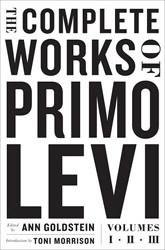
The Truce by Primo Levi
The Truce is Primo Levi’s account of his liberation from Auschwitz and slow return to life in the destroyed Europe of 1945. Darkness and humor coexist, as in this moment in Krakow: “Now, that priest, young and with a kind face, understood neither French nor German; as a result, for the first and only time in my post-scholastic career, I got some use out of years of classical studies by initiating in Latin the strangest and most tangled of conversations (‘Pater optime, ubi est mensa pauperorum?’)”. Too often, we’re given tidy narratives of the period that gloss over its impossible complications. The opposite is true in Levi’s precise gaze. We’re granted access to this shattered time in all of its dirt, fleas, and humor; the moments where people begin to recover their humanity along with their flesh.
Elisheva Fox, author, most recently, of Spellbook for the Sabbath Queen
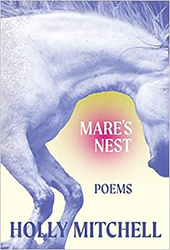
Mare’s Nest by Holly Mitchell
Mare’s Nest by Holly Mitchell is a poetry collection I would recommend without reservation for the High Holidays, as we look to G‑d as Avinu Malkeinu. Mitchell uses horses as teachers, much as Adam and Eve learned about themselves from the animals in Eden. Her poems are a lilting meditation on parenting as a conduit for active choice, whether that choice is violent or loving.
Eden Pearlstein, managing editor at Ayin Press
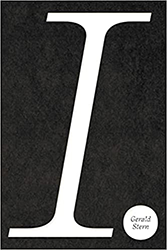
I. by Gerald Stern
The literary form I am most drawn to during the High Holidays is the contemporary long poem. The anxiety, curiosity, and suspension of disbelief required to begin and stick with a long, difficult work of poetry approximates for me a day spent in shul wading through hundreds of pages of arcane Hebrew poetry. For those who are similarly adrift during the Days of Awe, I whole-heartedly suggest the book-length poem I. by the inimitable Gerald Stern (May his memory be a blessing). The one-letter title refers to the prophet Isaiah (famous critic of empty ritual), as well as the slippery fish of the self. The entire book (including a moving introduction by Ross Gay and intertextual afterword by Alicia Ostriker) is a riotous reflection on life, death, power, justice, beauty, and what really matters — making it a perfect companion for this season of introspection and exaltation.